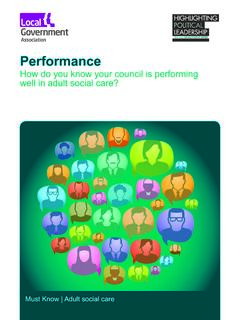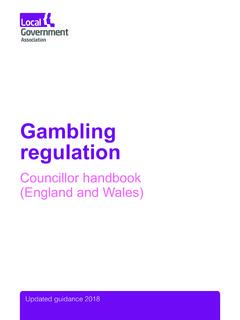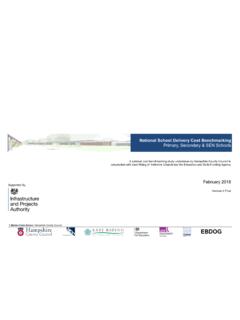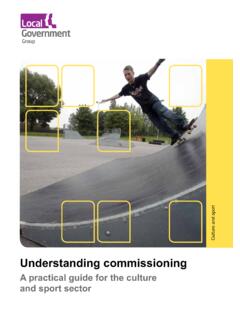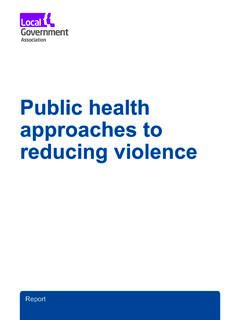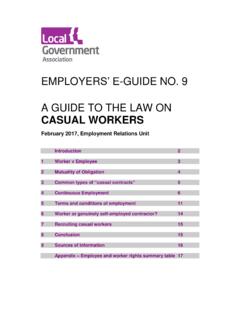Transcription of for councillors and officers - Local Government Association
1 Probity in planningfor councillors and officersEnvironment, housing , planningand wasteForeword 4 Introduction 4 Background 4 The general role and conduct of councillors and officers 5 Registration and disclosure of interests 7 Predisposition, predetermination, or bias 8 Development proposals submitted by councillors and officers , and council development 9 Lobbying of and by councillors 9 Pre-application discussions 11 officer reports to committee 12 Public speaking at planning committees 13 Decisions which differ from a recommendation 13 Committee site visits 15 Annual review of decisions 15 Complaints and record keeping 16 List of references 16 Flowchart 17 ContentsThis publication was prepared by Trevor RobertsAssociates for the Planning Advisory Service.
2 It alsoincludes contributions from officers from various 20134 Probity in planning for councillors and officersForewordThis 2013 update to the 2009 version of the Local Government Association sProbity in Planning guide reflects changesintroduced by the Localism Act 2011. Itclarifies how councillors can get involved inplanning discussions on plan making and onapplications, on behalf of their communitiesin a fair , impartial and transparent way. This guide has been written for officers andcouncillors involved in planning. Councillorsshould also be familiar with their own codesof conduct and guidance. This guide is not intended to nor does itconstitute legal advice. councillors andofficers will need to obtain their own legaladvice on any matters of a legal natureconcerning matters of probity.
3 IntroductionPlanning has a positive and proactive role toplay at the heart of Local Government . It helpscouncils to stimulate growth whilst lookingafter important environmental areas. It canhelp to translate goals into action. It balancessocial, economic and environmental needs toachieve sustainable development. The planning system works best whenofficers and councillors involved in planningunderstand their roles and responsibilities,and the context and constraints in which decisions involve balancing manycompeting interests. In doing this, decisionmakers need an ethos of decision-making in the wider public interest on what can becontroversial is recommended that councillors shouldreceive regular training on code of conductissues, interests and predetermination, aswell as on planning matters.
4 BackgroundIn 1997, the Third Report of the Committee onStandards in Public Life (known as the NolanReport) resulted in pressures on councillors to avoid contact with developers in theinterests of ensuring probity. In today s place -shaping context, early councillor engagementis encouraged to ensure that proposals forsustainable development can be harnessedto produce the settlements that communitiesneed. This guidance is intended to reinforcecouncillors community engagement roleswhilst maintaining good standards of probitythat minimizes the risk of legal challenges. Planning decisions are based on balancingcompeting interests and making an informedjudgement against a Local and national policyframework.
5 Decisions can be controversial. The risk ofcontroversy and conflict are heightened bythe openness of a system which invites publicopinion before taking decisions and the legalnature of the development plan and decisionnotices. Nevertheless, it is important that the decision-making process is open in planning for councillors and officersOne of the key aims of the planning system is to balance private interests in thedevelopment of land against the wider publicinterest. In performing this role, planningnecessarily affects land and propertyinterests, particularly the financial value oflandholdings and the quality of their views are often strongly held bythose involved. Whilst councillors must take account of theseviews, they should not favour any person,company, group or locality, nor put themselvesin a position where they may appear to be doing so.
6 It is important, therefore, thatplanning authorities make planning decisionsaffecting these interests openly, impartially,with sound judgement and for justifiablereasons. The process should leave no grounds forsuggesting that those participating in thedecision were biased or that the decision itself was unlawful, irrational or guidance is not intended to be circumstances may provide reasons forlocal variations of policy and practice. Everycouncil should regularly review the way in whichit conducts its planning business. This guidance refers mainly to the actions ofa Local authority planning committee as theprincipal decision-making forum on planningmatters. It is recognised, however, thatauthorities have a range of forms of decision -making: officer delegations; area committees;planning boards, and full council.
7 This guidance applies equally to thesealternative forms of decision-making. Indeed, it becomes very important if the fullcouncil is determining planning applicationsreferred to it, or adopting Local plans andother policy documents, that councillorstaking those decisions understand theimportance of this guidance. The guidancealso applies to councillor involvement inplanning enforcement cases or the makingof compulsory purchase orders. The general role and conductof councillors and officersCouncillors and officers have different but complementary roles. Both serve thepublic but councillors are responsible to theelectorate, whilst officers are responsible to the council as a whole. officers advisecouncillors and the council and carry out the council s work.
8 They are employed bythe council, not by individual councillors . Asuccessful relationship between councillorsand officers will be based upon mutual trust,understanding and respect of each other spositions. Both councillors and officers are guided bycodes of conduct. The 2011 Act sets out a duty for each Local authority to promoteand maintain high standards of conduct by councillors and to adopt a Local code ofconduct. All councils had to adopt a localcode by August adopted code should be consistent with the principles of selflessness, integrity,objectivity, accountability, openness, honestyand leadership. 6 Probity in planning for councillors and officersIt should embrace the standards central to the preservation of an ethical approach to council business, including the need to register and disclose interests, as well as appropriate relationships with othercouncillors, staff, and the public.
9 Many localauthorities have adopted their own, separatecodes relating specifically to planningalthough these should be cross referencedwith the substantive code of conduct for thecouncil. Staff who are chartered town planners aresubject to the Royal Town Planning Institute(RTPI) Code of Professional Conduct,breaches of which may be subject todisciplinary action by the Institute. Manyauthorities will have adopted a code ofconduct for employees and incorporatedthose or equivalent rules of conduct into thecontracts of employment of addition to these codes, a council sstanding orders set down rules which governthe conduct of council and officers should be cautiousabout accepting gifts and hospitality andshould exercise their discretion.
10 Anycouncillor or officer receiving any such offers over and above an agreed nominalvalue should let the council s monitoringofficer know, in writing, and seek advice as to whether they should be accepted ordeclined. Guidance on these issues for bothcouncillors and officers should be included inthe Local code of conductEmployees must always act impartially andin a politically neutral manner. The LocalGovernment and housing Act 1989 enablesrestrictions to be set on the outside activitiesof senior officers , such as membership ofpolitical parties and serving on anothercouncil. Councils should carefully considerwhich of their officers are subject to suchrestrictions and review this and serving councillors must not act as agents for people pursuing planningmatters within their authority even if they arenot involved in the decision making on it.
